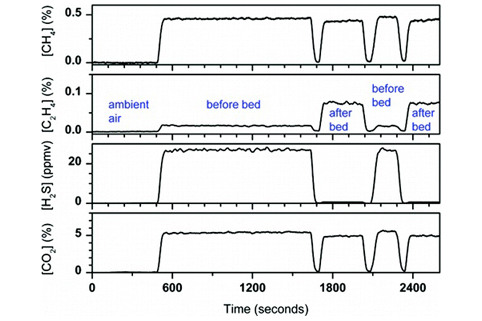—— PROUCTS LIST
應用LGR痕量氣體分析儀測定JP-8中的H2S
Rapid, Online Quantification of H2S in JP-8 Fuel Reformate Using Near-Infrared Cavity-Enhanced Laser Absorption Spectroscopy
應用LGR激光痕量氣體分析儀快速在線量化JP-8(特級航空材料)中的H2S
Feng Dong?, Christian Junaedi?, Subir Roychoudhury?, and Manish Gupta*?
? Los Gatos Research, 67 East Evelyn Avenue, Suite 3, Mountain View, California 94041, United States
? Precision Combustion, Inc., 410 Sackett Point Road, North Haven, Connecticut 06473, United States
Anal. Chem., 2011, 83 (11), pp 4132–4136
DOI: 10.1021/ac200300t
Publication Date (Web): May 3, 2011
Copyright ? 2011 American Chemical Society
Abstract
 <!--[if !vml]-->
<!--[if !vml]--> <!--[endif]-->
<!--[endif]-->
One of the key challenges in reforming military fuels for use with fuel cells is their high sulfur content, which can poison the fuel cell anodes. Sulfur-tolerant fuel reformers can convert this sulfur into H2S and then use a desulfurizing bed to remove it prior to the fuel cell. In order to optimize and verify this desulfurization process, a gas-phase sulfur analyzer is required to measure H2S at low concentrations (<1 ppmv) in the presence of other reforming gases (e.g., 25–30% H2, 10–15% H2O, 15% CO, 5% CO2, 35–40% N2, and trace amounts of light hydrocarbons). In this work, we utilize near-infrared cavity-enhanced optical absorption spectroscopy (off-axis ICOS) to quantify H2S in a JP-8 fuel reformer product stream. The sensor provides rapid (2 s), highly precise (±0.1 ppmv) measurements of H2S in reformate gases over a wide dynamic range (0–1000 ppmv) with a low detection limit (3σ = ±0.09 ppmv in 1 s) and minimal cross-interferences from other present species. It simultaneously quantifies CO2 (±0.2%), CH4 (±150 ppmv), C2H4 (±30 ppmv), and H2O (±300 ppmv) in the reformed gas for a better characterization of the fuel reforming process. Other potential applications of this technology include measurement of coal syngas and H2S in natural gas. By including additional near-infrared, distributive feedback diode lasers, the instrument can also be extended to other reformate species, including CO and H2.
閱讀原文:http://www.ncbi.nlm.nih.gov/pubmed/21486070

